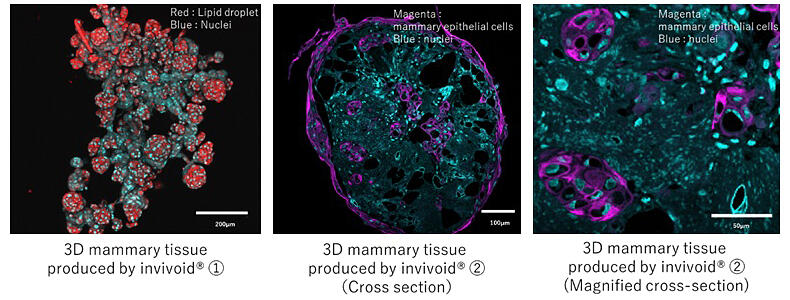Professor Michiya Matsusaki of the Graduate School of Engineering at Osaka University, TOPPAN Holdings, The Food Science Institute Foundation, and Meiji have announced that they developed a technology to produce three-dimensional (3D) mammary gland tissue capable of synthesizing a milk-like substance by utilizing the 3D cell culture technology "invivoid." The mammary gland tissue produced was confirmed to have a luminal structure similar to that found in a living body and synthesize milk proteins in response to hormones. The technology is expected to contribute to reconstructing mammary gland tissue for breast cancer patients and producing cultured milk. The results were presented at the "World Biomaterials Congress" in Korea (May 26-31).

Provided by Osaka University
Breast cancer is the most common cancer in women, and the number of cases has been increasing year by year. Although the cure rate has improved, many breast cancer survivors have to give up on breastfeeding because the mammary glands, which are the sites of breast milk synthesis, cannot be reconstructed by breast implantation, adipocyte grafting, and other procedures of breast reconstruction after mastectomy.
Previously, Matsusaki and TOPPAN Holdings jointly developed the cell culture technology "invivoid," which uses proprietary materials such as collagen microfiber to control the movement and position of two or more types of cells to produce tissue that mimics the living body. Furthermore, in January 2022, Osaka University, Kyoto Prefectural University of Medicine, and TOPPAN Holdings established an invivoid-based technology to generate miniature (approximately 900 µm) breasts composed of adipocytes, adipose-derived stem cells, and vascular endothelial cells on a collagen microfiber scaffold.
In the present study, Osaka University, TOPPAN Holdings, The Food Science Institute Foundation, and Meiji jointly promoted the development of a technology to produce human mammary gland tissue ex vivo for the synthesis of a milk-like substance and the research and analysis of the synthesized substance's components. The mammary gland tissue that could synthesize a milk-like substance was successfully produced ex vivo. This tissue was confirmed to synthesize the milk protein casein in response to hormones, just like hormone-induced casein synthesis by the mammalian mammary gland tissue in vivo. They also confirmed that the efficiency of casein synthesis was about two times as high as without collagen microfibers.
Matsusaki said, "Moving forward, we hope to develop mammary gland tissue capable of secreting the main components of breast milk by focusing our research on the control of milk secretion.
This article has been translated by JST with permission from The Science News Ltd. (https://sci-news.co.jp/). Unauthorized reproduction of the article and photographs is prohibited.




